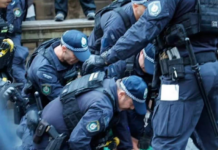A New Zealand-based media research and publication group has called for an “urgent rethink” on Papua New Guinea’s draft media development policy, saying its proposed regulation plan for the country’s media council and journalists threatened a free press.
The Asia Pacific Media Network Inc. (APMN), publishers of the research journal Pacific Journalism Review, said in a statement that it supported the Community Coalition Against Corruption (CCAC) plea for more time to be granted for public consultation.
The CCAC is a loose coalition of NGOs chaired by Transparency International-PNG and the PNG Media Council and is supported by churches, chambers of commerce, the Ombudsman Commission and the Office of the Public Solicitor.
- READ MORE: Learn from Timor-Leste ‘freedom’, says former PNG media council head
- NGO group criticises ‘haste over media policy’ that may hit PNG freedom
- Papua New Guinea: Concerns raised at swift review period for media policy
- Other PNG media reports
While noting that the Ministry of Information and Communications Technology had granted an extra week from today following the original 12 days for submissions on the draft National Media Development Policy 2023, the APMN said this was still “manifestly inadequate and rather contemptuous of the public interest”.
“In our view, the ministry is misguided in seeking to legislate for a codified PNG Media Council which flies in the face of global norms for self-regulatory media councils and this development would have the potential to dangerously undermine media freedom in Papua New Guinea,” the statement said.
The statement was co-signed by the APMN chair Dr Heather Devere; deputy chair Dr David Robie, a retired professor of Pacific journalism and author, and a former head of journalism at the University of Papua New Guinea in the 1990s; and Pacific Journalism Review editor Dr Philip Cass, who was born in PNG and worked on the Times of Papua New Guinea and Wantok newspapers.
“The draft policy appears to have confused the purpose of a ‘media council’ representing the ‘public interest’ with the objectives of a government department working in the “national interest’,” the statement said.
Risk to PNG media freedom
“If the ministry pushes ahead with this policy without changes it risks Papua New Guinea sliding even further down the RSF World Press Freedom Index. Already it is a lowly 62nd out of 180 countries after falling 15 places in 2021.”
The statement made reference to several principles for media freedom and media councils, including Article 42 of the Papua New Guinea Constitution, the M*A*S systems of media accountability and ethics pioneered by Professor Claude-Jean Bertrand, and the 2019 declaration for press freedom of the Melanesian Media Freedom Forum.
It said the ministry needed to consult more widely and take more time to do this.
The APMN called on the ministry to “immediately discard” the proposed policy of legislating the PNG Media Council and regulating journalists and media “which would seriously undermine media freedom in Papua New Guinea”.
It also asked the ministry to extend the public consultation timeframe with a “realistic deadline to engage Papua New Guinean public interest and stakeholders in a meaningful dialogue”.
It added that “essentially journalism is not a crime, but a fundamental pillar of democracy as espoused through the notion of a Fourth Estate and media must be free to speak truth to power in the public interest not the politicians’ interest”.
#APMN calls for ‘urgent rethink’ over #PNG draft #media #regulation plan #AsiaPacificReport #pngmediapolicy #mediafreedom #pressfreedom #mediaregulation @Scott_Waide @kenneth_gorethy @PeterCronau @PNGAttitude @PngPles https://t.co/rPdY3iuQ7e pic.twitter.com/luETmgbwfU
— David Robie (@DavidRobie) February 20, 2023











































